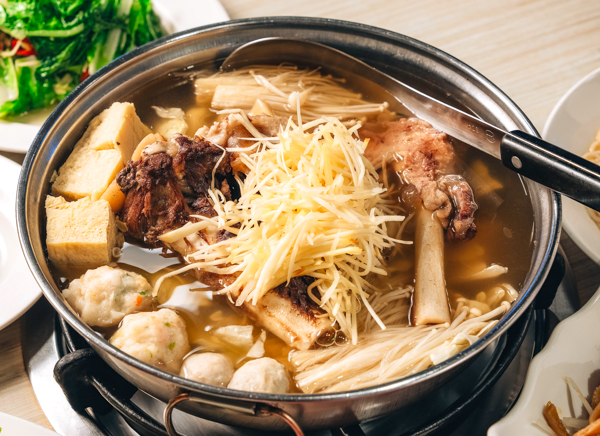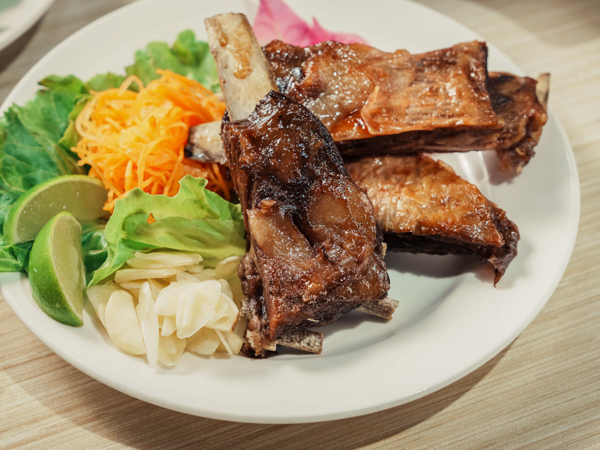Three Taipei Hot-Pot Restaurants Sure to Warm You Up
TEXT I JENNA LYNN CODY
PHOTOS | RAY CHANG
Autumn in Taipei means one thing above all for Taipei’s foodie set: hot-pot season. As the nights turn cooler, the city’s bubbling cauldrons start calling. From the mutton-rich flavors of More Joy Young to the beefy indulgence of Red Ox Brother to the fiery Sichuan spiciness of Chan Chi Hot Pot Lab, Taipei simmers with irresistible choices.
Chan Chi Hot Pot Lab – Ximen Great World
The interior is as fiery red as the broth at Chan Chi Hot Pot Lab, a trendy Taipei hot-pot institution. The retro flair begins with the neon sign outside and continues through the folding metal stands, stainless-steel fittings, and burnt-umber walls, laminate floor, and brickwork in this basement-level restaurant. Given the old Taipei vibes, one might think this branch of the three-outlet group in Taipei City’s Ximending area is the original, but that honor actually belongs to the Xinzhuang District location in New Taipei City. Don’t let the old-school vibes fool you: this is where the local youth go for hot pot.


The star of the show at Chan Chi is the mala soup base, known for being one of the hottest in Taiwan. Jellied duck blood turns the broth into a dark flavor bomb, along with Sichuan numbing spice and countless red chilis. If you’ve ever wanted to know what a “chili high” (a real phenomenon triggered by the peppers’ capsaicin) feels like, this is the place to get one. A clear broth is also available on its own or in a divided pot if you think your tongue can’t handle it.


The point of hot pot is to cook the ingredients in the soup base yourself, and Chan Chi has some of the best in the city. Squid and shrimp paste with fish roe and tofu are popular choices, as they soak up the hot broth, and tougher meat dishes such as tendon and intestine turn soft and delicious in the bubbling pot. Safer options include thin-sliced pork belly and a variety of meatballs: shrimp, pork, beef, taro, and mushrooms. A generous sauce bar encourages guests to build their own perfect dipping blend, from sesame oil and vinegar to raw garlic and fiery chilies.




Chan Chi Hot Pot Lab – Ximen Great World | 詹記麻辣火鍋-西門大世界
Tel: (02) 2701-0053
Add: B1, No. 81, Chengdu Rd., Wanhua Dist., Taipei City
(台北市萬華區成都路81號B1)
Tel: (02) 2311-1800
Hours: 12pm-1am
FB: www.facebook.com/ChanChiHotPots
IG: www.instagram.com/chanchihotpotlab
More Joy Young
When the mutton hot pot is bubbling at any of the branches of this venerable Taipei establishment, you can smell it from the street. Warm, slightly gamey mutton tinted with ginger beckons you inside, especially on a chilly day. More Joy Young specializes in mutton: its hot pot is renowned across Taiwan, and each side dish boasts its own unique flavor profile. The Songshan District location in Taipei City is the oldest, opened in 1992, and the branches in the city’s Da’an and Neihu districts have each been open for about two decades. The Da’an branch is bright and spotless, with the large upstairs windows letting in natural light and the sight of leafy treetops. More Joy Young frequently features in the island’s media and has been included in the United Daily News’ 500 Dishes guide for several years.



The most popular dish is the signature mutton hot-pot set for two, which can be shared among a larger group with the addition of a few side dishes. Larger hot pots are also available. The broth is rich and complex, prepared by simmering mutton bones and tougher meat cuts for three to four hours. Both clear stewed and soy sauce-braised “red” broth are available, as well as divided pots with both. The clear broth is lighter, suitable for all types of weather, including Taipei’s warmer autumn days. January to March are the chain’s busiest months; customers will find it easier to get a table in mid-autumn or spring.

Enoki mushrooms and a heaping portion of julienned ginger are added before bringing the pot to the table, giving the broth depth and a sweetish spice undertone. Lamb meatballs, vegetable balls, and whorls of thin-sliced mutton shoulder, all cooked at the table, are popular additions. Cubed tofu or tofu skin, cabbage, and other typical hot-pot sides fill out the meal.

The set for two includes several side dishes: stir-fried seasonal vegetables, chilled mutton stomach, sesame-oil thin noodles, and shacha mutton. The stomach has an excellent mouthfeel without being overly chewy, and is prepared in a fiery-red chili oil; the shacha mutton is a delicate balance of briny, spicy, smoky shacha sauce and sliced meat. The sesame-oil noodles taste great on their own and in a bowl with some of the hot-pot broth.


Traditionally, mutton hot pot comes with a preserved-tofu dipping sauce made with tangy fermented tofu, the strong flavor pairing well with gamey mutton. More Joy Young’s preserved-tofu sauce is made in-house. The flavors of both the broth and preserved-tofu sauce are reminiscent of southern Taiwanese cooking; Tainan City natives have been known to come here seeking comfort food that reminds them of home. According to traditional Chinese medicine, mutton hot pot is warming (in the medicinal sense as well as temperature), stimulating and nourishing for all manner of organs, including the liver and gallbladder.
Don’t miss the other side dishes, many of which are beloved in their own right. The dry-fried mutton rib strips are a standout: tenderized rib meat is breaded and fried with a Taiwanese fried chicken salt-and-pepper seasoning and topped with dry-fried green beans and heaps of garlic. It pairs perfectly with beer or More Joy Young’s custom-made sake. Mutton with basil tops the spice charts and has an herbal kick, and the chashao ribs come in thick slabs you can sink your teeth into, and have the sweetness of the famous chashao pork buns. The lemon cuts the sweetness, and the garlic adds an allicin tang. The best-known side dish is the French-style mutton shank. The shank is roasted until it’s fall-off-the-bone tender, carefully seasoned with a European flavor profile, and served with a spicy mustard dipping sauce.


More Joy Young | 莫宰羊
Tel: (02) 2577-5415
Add: No. 30, Beining Rd., Songshan Dist., Taipei City
(台北市松山區北寧路30號)
Hours: 11am-2pm, 5pm-1am
Website: www.mjy.com.tw
FB: www.facebook.com/fans.mjy
IG: www.instagram.com/morejoyyoung
Red Ox Brother Shantou Hot Pot
The “red” in “Red Ox Brother” isn’t your ordinary red. The Chinese character used, 赤, denotes something closer to crimson or carmine: specifically, the bright, bloody color of raw beef. Where More Joy Young specializes in mutton, beef is the name of the game at Red Ox Brother. Founded over 70 years ago in Pingtung County in the south, Red Ox Brother opened its doors in Taipei in 2014 to great acclaim, and has since been called the best Shantou-style hot pot in the city. The interior is comfortable and moody, with black leather chairs and red lanterns. The restaurant is tucked away in a quiet lane just south of Xingtian Temple, a major tourist attraction.


Shantou hot pot is a traditional style of hot pot from the Chaoshan region of China’s Guangdong province. It has become very popular in communities of Chinese immigrants who settled in Southeast Asia. The key ingredient is shacha, a sauce blend that varies by region but commonly contains ingredients such as peanut powder, dried seafood or fish, shallot, red chili, soy sauce, sesame, garlic, and oil. It’s a relative of Southeast Asia’s satay sauce. Shacha can be used as a stir-fry flavoring, dipping sauce, soup base, and more.

Red Ox Brother makes its own, taking pride in imbuing it with a pungent flavor that is neither too heavy nor too greasy. It’s so popular that it’s also sold in jars for customers to take home. The “shacha bar” at Red Ox Brother includes the signature shacha, as well as sesame oil, minced garlic, hot chili, green onion, and slivered ginger. Some believe shacha pairs particularly well with beef, as it removes the “fishy” taste of raw meat.
The restaurant has two signature soup bases: a clear broth with preserved vegetables, goji berries, and licorice root; and a flatfish broth with shacha. As in many hot-pot restaurants, divided pots with both broths are available. The clear broth hints at traditional health concoctions without being overly medicinal, and the flatfish broth is deep and aromatic.

Ingredients to cook in the hot pot, taken from the refrigerators at the back, are sold at various price points. The most popular dish is also the most difficult to get: Tainan “warm body” beef. This beef, which is only produced in Tainan, has never been refrigerated; to ensure food safety, it must be served the same day the animal is slaughtered. It is prized for its delicate flavor and tenderness, which are believed to be impacted by refrigeration. The unique production method for such beef means that only a limited amount is available each day. Customers who are lucky enough to get it will often dip it in the hot pot for only a few seconds, just enough time to give it a lightly cooked exterior but otherwise remain rare. The flatfish shacha broth is often touted as a superior pairing for “warm body” beef, but this is a matter of personal preference.

Red Ox Brother offers many other cuts of beef for hot pot, too. Some of the choicest options include A5 Japanese wagyu and marbled beef sliced in paper-thin strips. Brisket and ribeye are also available, as well as beef tendon and tongue. The handmade beef meatballs have a springy mouthfeel and deep meaty flavor, and are served with cuttlefish meatballs colored black with the cuttlefish’s natural ink.


Although most customers zero in on beef, don’t overlook Red Ox Brother’s seafood offerings. The seafood paste, served in a half-cylinder, is a unique offering. It’s made with fish, shrimp, and imitation shark fin, and it’s scooped into the hot pot, where it solidifies. The double seafood platter provides especially good value: it comes with generous slices of Taiwanese tilapia, whole neritic squid, clams, and massive, fleshy shrimp. Handmade dumplings from Keelung, a north Taiwan harbor city, are available in limited quantities and feature a variety of fillings, including fish, shrimp, and pork.

Red Ox Brother Shantou Hot Pot | 赤牛哥汕頭火鍋
Tel: (02) 2775-3256
Add: No. 2, Ln. 313, Songjiang Rd., Zhongshan Dist., Taipei City
(台北市中山區松江路313巷2號)
Hours: 11:30am-2pm, 5pm-9:30pm
IG: www.instagram.com/redoxtp
FB: www.facebook.com/RedBullBrotherHotPot
Website: www.redoxbro.com







